When reggae maestro Maddoxx got his groove back
Just when we were thinking that he was finished, to the delight of many fans, he seemed to have hauled himself back to life again.
ENTERTAINMENT | MADDOXX SSEMATIMBA
As published in The New Vision, Friday, July 29, 2016
Maddoxx Ssematimba was a legend forgotten by the audience, written off by music critics and consumed by alcohol and substance. He is now back where he belongs — performing on stage and grabbing headlines at corporate dos. His new video, the first ever, is causing ripples on the Internet. The forgotten reggae maestro, who was plagued by misery and served a stint in prison, has found his groove once again, writes Joseph Batte and Steven Odeke.
_________________________________
Eighteen years ago, Maddoxx Ssematimba breezed on the local scene. He wrenched our hearts out with an arresting masterpiece — a 10-track album titled Tukolagane, which spawned the monster hit, Namagembe. But marijuana and alcohol took its toll on his health and career.
The two substances sucked the verve out of him and his music like a leech. Suddenly, he stopped singing and performing. But life is full of unexpected twists and turns. Just when we were thinking that he is finished, to the delight of many fans, he seems to have hauled himself back to life again.
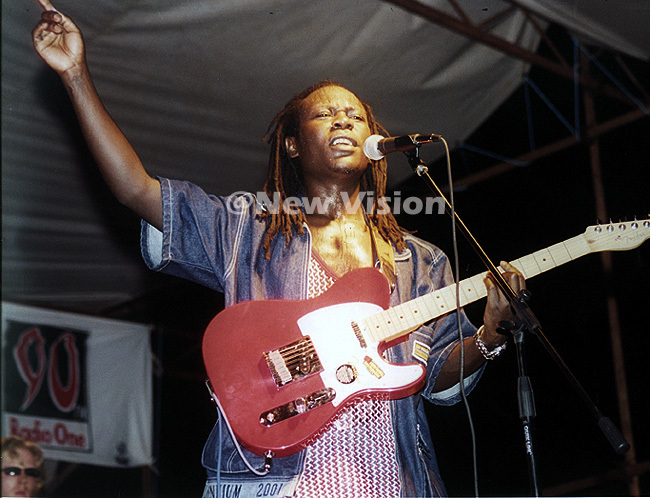 Maddoxx is a legend of the craft
Maddoxx is a legend of the craft
Hunger for Maddoxx
The video of his hit song Namagembe caused quite a buzz on the Internet when it was released last week.
This year, Maddoxx has been the crowd favourite at several corporate and social events like Blankets and Wine, Qwela Junction Crooners, MultiChoice's African Day celebrations and, very recently, at Roast and Rhyme.
Joe Kahirimbanyi, the Qwela Junction Crooners event's organiser, told The Beat during the launch of the concert that having Maddoxx, on that Crooners edition completed the package. "Maddoxx is a legend. It is an honour to have him on this edition because he liked the concept," he said.
Today, Maddoxx is a hot cake. He still cherishes his Rastafarian principles. He integrates his performances with them in attire, choreography and delivery. His journey to redemption could have been stirred by easing up and opening his doors to everyone.
Swangz Avenue's Benon Mugumbya, who has got him some gigs, attributes his resurrection to his easy-approach attitude. "There has been a lot of vibe that Maddoxx is complicated, but that is not true," he says. "A lot of people asked me how I managed to get him (to perform at the Roast and Rhyme concert), but he is not really complicated. He has a manager who is doing a great job."
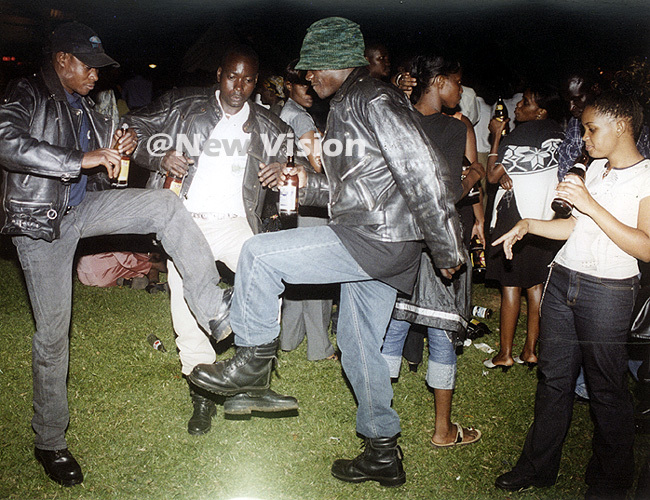 TIMELESS: Maddoxx's music continues to grace the airwaves
TIMELESS: Maddoxx's music continues to grace the airwaves
In fact, Maddoxx is now used as bait to draw crowds to events using social media video ads where he is reassuring fans that he will performing at an event. Flower Kenyangi, House of DJs' media administrator, an entertainment company that has featured him on some of its events, says Maddoxx sells because of his unique music.
"He is a legend and he is trying to make a comeback. His music has not died and he is easy to work with. We are more than business partners with him." Loukman Ali, the cinematographer responsible for making the Namagembe video free-of-charge, says he was only too glad to shoot the video even if it took him over two years to get it done.
"I was determined to make the video for him because he is my favourite Ugandan artiste. He might be facing hard times, but that is life. Actually I am honoured that he let me," Loukman says.
Making of Maddoxx
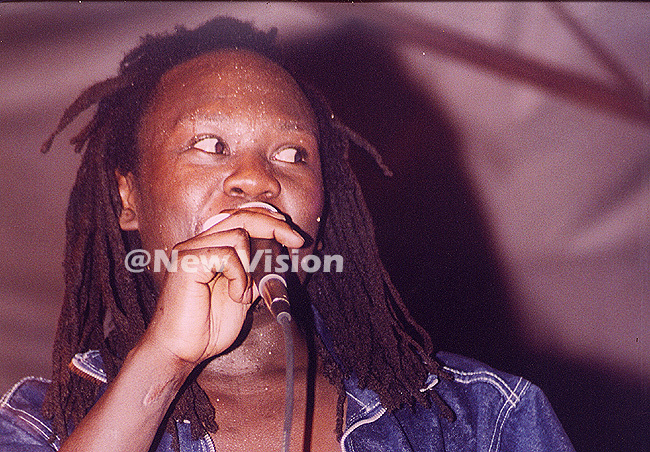
Many have heard the name Maddoxx, yet, fewer know him. Eighteen years is a long time. Many fans were not yet born. Some were still wetting their beds when Maddoxx became the rage.
On the surface, Maddoxx comes across as a guy with no airs around him, who loves to crack jokes and make everyone around him happy. When asked how it feels to be a star, he shoots back almost angrily: "I do not know what being a star means. Yes, it might feel good to show off as a star, but who am I to show off?" he asks.
He is wary of the press and evades talking about his private life. One has better luck squeezing water out of a stone than convincing Maddoxx to talk about himself. It also depends on his mood. I was lucky to find him bubbly. "I was born David Amon Ssemanda Ssematimba in Kampala in 1971, to the late Ananias Ssematimba and Ephrance Nalwanga. My father passed away when I was only three years old. So, we were brought up under the watchful eye of our strict mother."
Maddoxx reveals that he was one of the pioneer students of Makonzi Boarding Primary School in Mubende district, in the mid-70s. It was at Makonzi that his love for music first manifested as a member of the school choir. Maddoxx later joined Busoga College Mwiri, where he was introduced to exotic music instruments such as guitars. At the time, Afrigo and Jimmy Katumba and the Ebonies were the rage.
During holidays, he would attend their gigs. He also loved watching Centra Volcano, a band made up of Ugandan and Congolese musicians. He loved listening to country songs by Don Williams, Kenny Rogers, and of course, Bob Marley. But it was the reggae vibes of Jamaican singer Gregory Isaacs that he admired most. He would later model his lazy-like singing to Gregory's laid-back style. After completing secondary school, Maddoxx got a teaching job with a primary school in Kabuusu near Nateete, Rubaga division, where he taught science, mathematics and music to P2 and P3 pupils from 1989 to 1990.
When he was not teaching, Maddoxx moved around Kampala suburbs playing the guitar, accordion or mouth organ to entertain crowds. "Music flows in our family. My father was a choirmaster for a village Christian group. My sister is a choir mistress, singer and instrumentalist with Jesus Worship Centre in Kampala. My brother, Alex Kaweesi, leads a gospel band," he says.
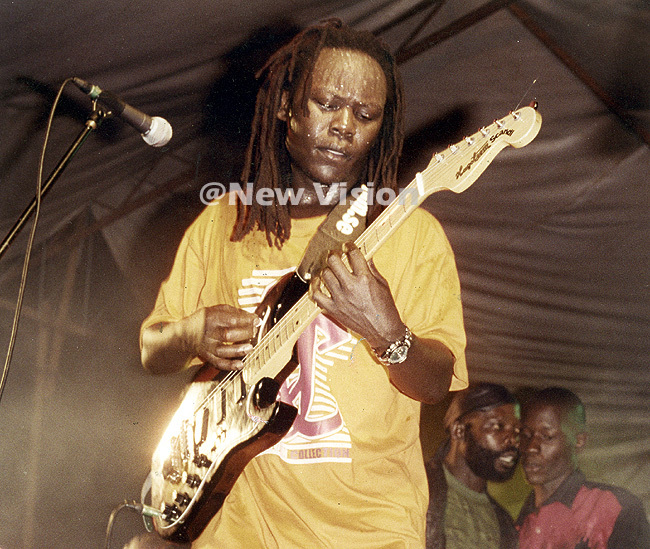 Doing what he does best with passion
Doing what he does best with passion
Relocating to Sweden
In the 1980s, his brother Allan Sematimba, immigrated to Sweden. Maddoxx, 20 years at the time, followed him in December 1991, but he was confined in a refugee camp for two years until the Swedish government granted him permanent residence.
Allan's first gift for Maddoxx, when he left the camp, was a keyboard. Maddoxx later got in touch with Ugandan musicians in Stockholm such as Kenneth Magoye, Frank Mbalire, Gerald Naddibanga and Sammy Kasule.
He started by playing conga for a local band. He later hit the night club scene after acquiring a guitar. In 1994, he teamed up with Magoye and other musicians to form Maxine Band. It collapsed as soon as it had taken off because other members were not full-time musicians.
The turning point in Maddoxx's life came when Magoye introduced him to Aggrey Sembatya, a lover of reggae and proprietor of Axe Productions, a recording studio on the west coast of Sweden. Sembatya was impressed by Maddoxx and the producer's love for reggae music influenced the young artiste to ditch country music for reggae.
Maddoxx briefly joined NAZARENES, a Swedish-based reggae band, with whom he used to tour Europe as a rhythm guitarist.
In 1995, Maddoxx met Eva Linck, a dark-haired Swedish woman, who later became his wife and mother of his two children. Maddox admits: "Meeting Sembatya and Eva was the turning point in my life and music career."
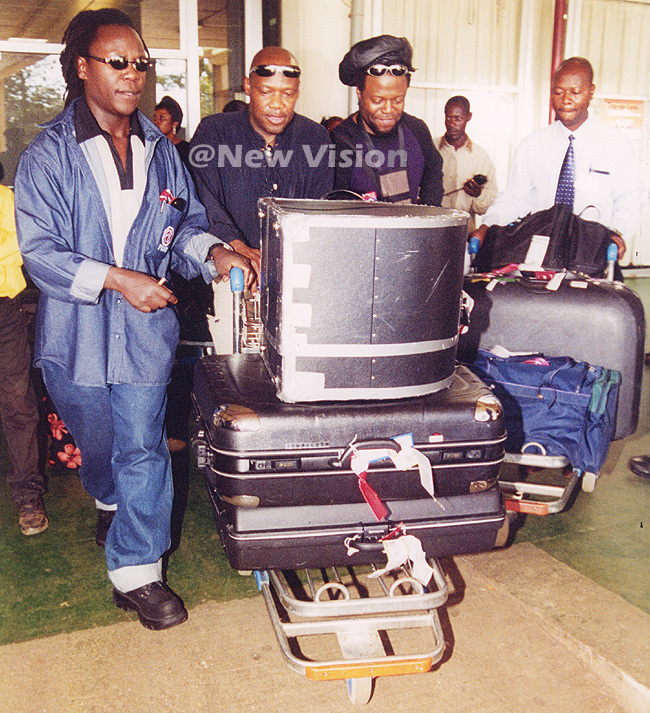 Maddoxx returns home for a show
Maddoxx returns home for a show
Namagembe is born
Maddoxx's biggest break came when he recorded Tukolagane album in 1998. In 2000, he sold it to late Eriya Bugembe of Kasiwukira for a whopping sh19m. Unfortunately, at the time Kasiwukira released it in Uganda, the local music landscape was changing dramatically.
Tastes were shifting to a new localised brand of dancehall music by young music heathens with stupid colourful names such as Menton Summer, Rasta Rob and Ragga Dee. Frenetic-paced Congolese Soukous from Paris by Loketo, Kanda Bongoman and Yondo Sister et al also dominated the airwaves.
Fred Sebatta was wowing fans with a new brand of cross-bred Kadongo Kamu created by Steve Jean and Tim Kizito at Kasiwukira studio. A new slick digitalised form of mid-tempo local Afro pop music, which later came to be known as band and kidandali, was winning many hearts.
Maddoxx's Tukolagane album was a jewel buried in all that musical chaos. It stayed in Kasiwukira's shop shelves for years with hardly any sales being made. Gayi, Kasiwukira's manager of operations, fumed that the millions paid to Maddoxx were money wasted. "Why did Maddoxx bother recording reggae, a style of music that does not sell in Uganda?" Gayi fumed as he handed the writer a copy of Weekend Vision to review.

It turned out to be a blessing and a curse. A curse because few Ugandan fans appreciated the genre. And less reggae music being made meant less exposure for Maddoxx. You get the drift?
It was, however, a blessing in disguise because less exposure made Maddoxx's reggae style unique. All the 10 tracks — Namagembe, Eddembe, Omukwano, Irene, Omuyimbi Bakadde Bange, Wowoto, Munakyalo and Omwami N'omukyala. Namagembe — had the ability to stand on their own as hits. He had delivered a lovely set of intoxicating, cooing ballads wrapped in bouncy rootsy lovers' rock reggae music in the mold of Gregory Isaacs.
According to Kasiwukira records, Namagembe, as the album later became popularly known, became the bestselling album for two years running, from 2000 to 2002 and was voted Song of the Year. Maddoxx became the toast of the country, a living legend.
In 2002, Hope Mukasa's Bava Promotions decided to cash in on his popularity. Maddoxx was reportedly paid $20,000 (about sh67m) to perform at Nakivubo stadium and Nile Hotel Gardens, now Serena Hotel Kampala and on Kabaka Mutebi's 47th birthday celebrations.
Nakivubo and Serena were packed to the rafters. The Nakivubo do was quickly followed by a private show for the Kabaka at his Banda Palace and two others in Jinja and Masaka respectively.
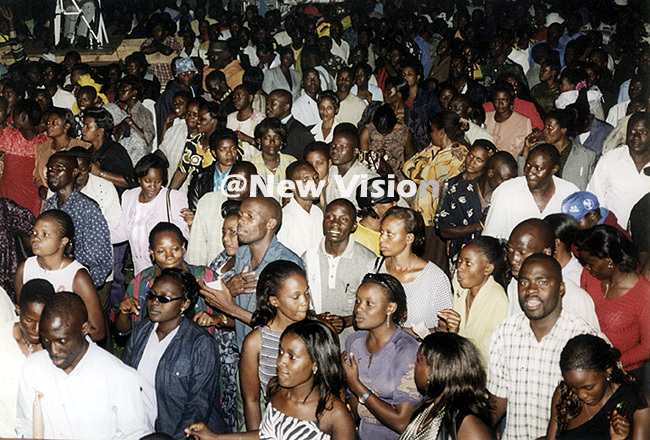 A huge crowd at a Maddoxx show at Nile Hotel
A huge crowd at a Maddoxx show at Nile Hotel
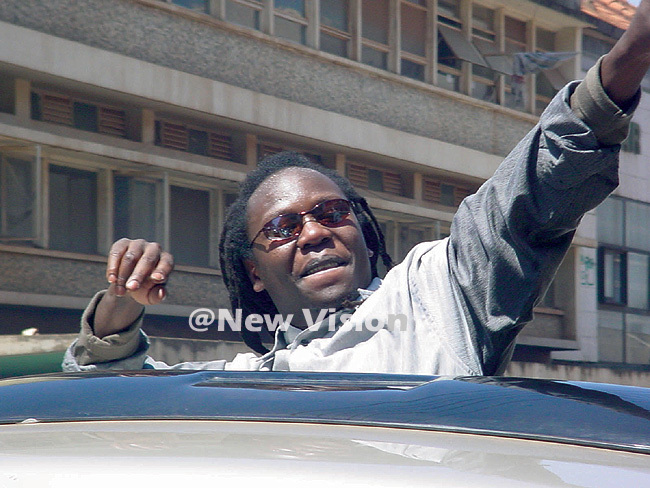 Arriving for a Valentine's Day show
Arriving for a Valentine's Day show
Watching Maddoxx Sematimba at Nakivubo War Memorial Stadium in action, it is difficult to imagine an artiste as talented and in control of himself on stage descending into drug-induced chaos later.
Beginning of the fall
The public's quest to know what had befallen their star rung across the country. How could such a musician suddenly fall from grace to grass?
Maddoxx's problems were selfinflictedand can be attributed to a lot of things dating as far back as February 2004, when the late Maj. Gen. James Kazini hired him to perform at Didi's World and Masaka Recreational Ground. The turn-up at both venues was poor and this was attributed to poor publicity.
In 2006, Kasiwukira forked out sh25m to buy the rights to publishing Maddoxx's second album, Abato. Although it lacked the magic of Tukolagane, all the 12 tracks had enough fire to keep Maddoxx's star still burning brightly.
Instead of flying home to promote it, Maddoxx remained in Sweden to enjoy the comfort of his warm flat, watching television. Big mistake! The album was quickly bumped off the charts by the likes of Bebe Cool, Juliana Kanyomozi, Jose Chameloene and Iryn Namubiru, who were making quite a big splash with their own brand of catchy Afropop music.
By the time Maddoxx returned in 2008, the popularity of his last album had waned so much that it was hardly played on the airwaves. He resorted to performing at low paying gigs. Rogue promoters grabbed the opportunity to cheat him. He was paid an advance of sh3m of sh6m to perform at a radio station's fete. One of his hangers-on withdrew the balance without his knowledge.
In 2011, he was arrested and locked up in Luzira Prison for failure to pay sh14m in bills at a guesthouse in Nankulabye, Rubaga division. It was alleged that the galaxy of hangers-blew the bill out of proportion.
As he slept off the effects of the booze he had taken the previous night, the hangers-on were busy ordering food and drinks. Whenever they were asked to pay, they would reply: "The boss (Maddoxx) will pay when he wakes up!"
Maddoxx was bailed out by lawyer Julius Kavuma Kabenge after Ragga Dee's fundraiser to rescue Maddoxx from jail failed.
 At the Mengo Magistrates Court: Fellow musician Bobi Wine bailed out Maddoxx
At the Mengo Magistrates Court: Fellow musician Bobi Wine bailed out Maddoxx
Drugs, booze and depression
Even after his release, Maddoxx stayed off balance. It was not only his music, but his love life was in tatters. He obviously could not return to Sweden, where rumour had it that he had been deported.
Some say he was running away from the Swedish authorities who were investigating the suspected use of his flat as a conduit for drugs by Nigerians.
The fact, is, he had had a bad split with his wife, who was given about 75% of the singer's estate as a sole custodian for their two children. This is what is cited by many as the reason for his depression. He drowned himself in alcohol and marijuana.
He got no gigs and lived a beggar's life. Maddoxx became an enigma. He had dramatic and unpredictable swings of temperament that left many jolted. What followed later was a portrait of a deeply troubled man detached from reality. His reputation got damaged and he was shunned by promoters.
Rumours started flying: He is selling fish and chapatti. He has run mad. The final nail in his coffin was in 2013 when the Police in Nakulabye, a Kampala suburb, nabbed him for being idle and disorderly.
His arrest made headlines on Bukedde TV's Agatalikko Nfuufu. The nation was shocked. Strangely, he was not apologetic nor did he condemn drug use. He told the
Police: "it (marijuana) helps my creativity." That arrest looked like a televised crucifixion of Maddoxx's career.
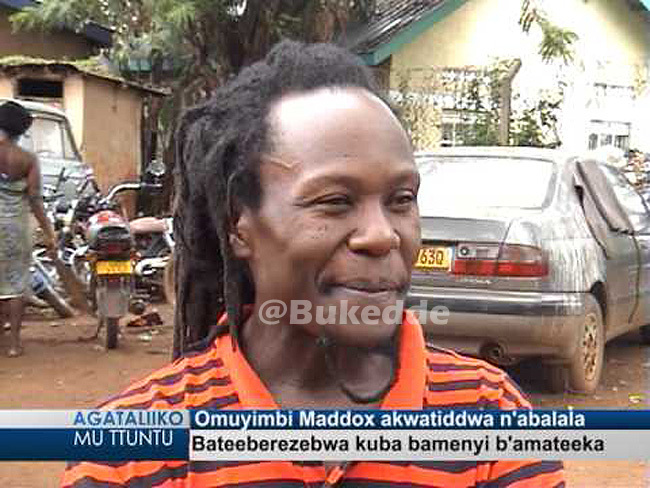
Rescue mission
But that sight, among others, dragged local musicians on a guilty trip as they could not bear seeing their own wither. They launched a Save Maddoxx Ssematimba campaign. Kabenge is one of the many fans that never gave up on him. He has patiently tried to nudge towards reviving his career. It seemed to work as Maddoxx was being knocked back in line.
Suddenly, gigs were streaming in. He managed to get into studio to try and make music. He was, however "unpredictable, unstable and difficult" to work with, according to some of the musicians who tried to revive his talent. "Sometimes you made an appointment with him but he failed to honour it. If he came, he would demand certain things done his way or no way," recalls one producer, who prefers to stay anonymous.
"He walked out on me several times. Sometimes I was not sure whether his agitation was a result of substance abuse or Maddoxx, being the perfectionist that he is, could not bear working with someone with a divergent view," the producer says.
"True, Maddoxx is a perfectionist," echoes Loukman Ali, a music video producer responsible for the current video of Namagembe. "So, for me, I was patient. If he did not feel like working, we stopped immediately. All bgreat people are hard to work with, so I have heard and read. I think it is because when you are very good at what you do, you do not trust others with your work. I guess if Maddoxx was not like that, he would not have had the great music," says Loukman.
With the patience of compassionate and understanding players in the industry, Maddoxx has started finding his way on concert stages, performing before huge crowds. Even without a new hit, the crowd showers him with love as they did in the past.
_________________________________

FAST FORWARD TO PRESENT DAY . . .
Maddoxx has been performing at many gigs and has also released a video of his popular hit Namagembe.
He is considered a music legend whose music still lives on. A gentle giant of the craft. Unmatched. But this is a title he has declined to take. He says he does not see himself as a legend.
But in the eyes of many of his fans, Madoxx is the greatest reggae star to have come out of Uganda.